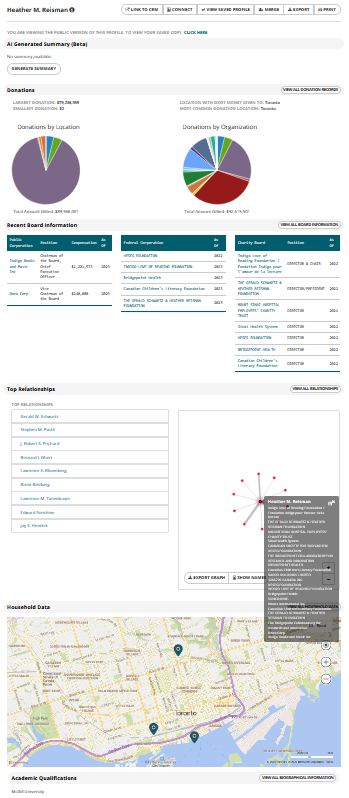Introducing the CharityCAN ARK
The Problem
Finding out where a potential donor has made charitable donations is hard work. Data from the CRA details donations from registered charities in Canada, but individual donations can only be found when they’re published via thank you messages and donor recognition walls in annual reports or online donor walls.
These types of donation records have always been available in CharityCAN because in the past we’ve been fortunate enough to license donation data from other providers. But this data had its issues too: without a copy of the donation source document, we couldn’t provide our users with accurate reference documents – a must-have for any serious prospect researcher. We also noticed that there were gaps in the data: smaller Canadian organizations and charities in Quebec were particularly underrepresented.
We’ve always been asked about the possibility of more of these donation records, but we’re a small team and ensuring data accuracy from so many different source documents was always a hurdle that was too big to clear. Until now!
The Solution
Recent advancements in AI don’t just lend themselves to chatbots. Advanced language models are also great at turning unstructured data into structured data – turning donor walls into database rows.
We’re excited to announce that we’ve harnessed the power of these models in what we’re calling the CharityCAN ARK: the Archived Record Keeper. The ARK has started archiving and processing donation records at scale, with the goal of surveying every Canadian charity for donation data on an ongoing basis.
These donation records have already made their way into CharityCAN’s donation record search results. Over the coming months you’ll see more data as we expand to more organizations and process our backlog of archived data sources. You’ll also be able to use this data in more places of our platform, including our donor screening and relationship data, so keep an eye out for more announcements.
Our Responsible Rollout
The reason we’re doing this piece by piece and moving slowly is that we want to ensure that we’re giving you, our users, data you can count on.
Even though we’re confident enough in our process to start publishing this data, the reality is that because we’re using AI models to process this data on a large scale, a few mistakes will slip through the cracks. Since we are providing our users with direct links to the archived source data, you’ll always be able to check our donation records to make sure they’re correct.
If they’re not correct – we want you to let us know about it. Did you find an issue in one of our records? Reach out and we’ll fix it! By letting us know, you’ll help us improve the ARK for other users going forward.
And if we’re missing data? Let us know that too! We can let you know if we can go looking for specific donation records, and if we can’t (say that organization’s website doesn’t allow web crawling or archiving) we’ll let you know.
We’re excited to move forward with the CharityCAN ARK and all the new data it will bring to the platform. As always, reach out to us with any questions or to see some of the new archives and records for yourself.
